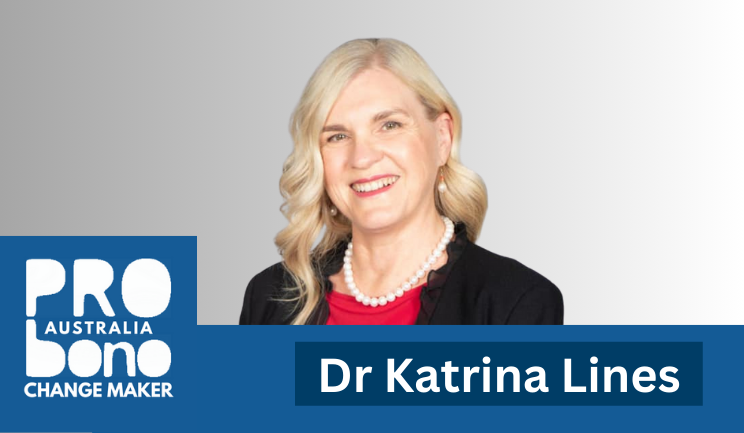This weeks Pro Bono Australia change maker is CEO of Act for Kids, Dr Katrina Lines. Established in 1988, Act for Kids operates over 30 centres with a team of over 450 dedicated staff including psychologists, speech therapists, early education specialists, counsellors, occupational therapists and family support workers. Katrina is a registered psychologist herself, with more than 20 years’ experience delivering clinical and social services at the individual, organisational and community level. She has a Ph.D in children’s cognitive, social and emotional development and postgraduate qualifications in governance, business and education.Read on for our change maker interview with Katrina!
1. Describe your career trajectory and how you got to your current position.
Like most people, I tried a number of things at the start of my working career and it was a while until I found the type of work that really satisfied me. In the early days I did everything from hospitality, retail, secretarial and cleaning work before and during study and I learned things from all of these roles. After studying psychology I worked in private practice and lectured at James Cook University until I landed a role at Act for Kids as Senior Practitioner. I’ve been with Act for Kids nearly 18 years, which I would never have predicted. However, I have had four different roles and multiple changes within some of those roles, so it has never felt like I’ve been stuck doing the same thing. I have been in the role of CEO for four years and love every minute.
2. What does this role mean to you?
I have a favourite quote by Martin Luther King Jnr: Power properly understood is nothing but the ability to achieve purpose. It is the strength to bring about social, political and economic change. So the role of CEO to me, is a privilege and a responsibility. It means that I work to influence the achievement of purpose every day in the complex work Act for Kids does. It also means that I advocate strongly for children, young people and families and for the human service workforce. My role is to ensure that all our team members are supported and cared for so they are able to support clients in their goals, and speak up for the kids and families we serve.
3. Take us through a typical day of work for you.
A typical day is quite busy with people – both with appointments and generally just being available. I find those incidental conversations are some of the best ways to connect with people and to reduce the amount of time spent reading, writing and answering emails. Quite a lot of my time is spent engaging with stakeholders of all kinds to advocate for our services and for support and funding. This can involve a fair bit of travel as we operate in four states. In order to get through the emails, reporting and other tasks, I am often in the office early to have a couple of hours of quiet focussed work time. My evenings might involve attending work and sector functions.
4. What is the biggest challenge you’ve encountered in your career, and how did you overcome it?
The biggest challenges have come from myself, not from external events or the environment. There have been wonderful opportunities throughout my life and in order to reach for them I have had to put myself out of my comfort zone. I have learned to trust my instincts and take a leap of faith even if I’m not 100% confident I have what it takes. It works out positively more than not and I’ve gained in knowledge, experience and confidence as a result.
5. If you could go back in time, what piece of advice would you give yourself as you first embarked on your career?
I think I would have to start by convincing myself that I knew enough about anything to give advice! Seriously though, the advice would be to stop worrying about what other people think about you and focus on your own development and values so you can do your best work. I would also say that believing in myself and taking those leaps of faith has worked out really well.
6. How do you stay motivated to work in this field?
It’s very easy to stay motivated. Act for Kids practitioners work so hard to support children, young people and families to make significant positive improvements in their lives and hearing feedback from clients about how things have changed for them is wonderful. If we can change small, but significant things for children that help them become happier, healthier and safer, then that makes everything worthwhile. I would not have been with this organisation for all these years if there wasn’t so much positivity and hope arising from team members, clients and our work.
7. How do you unwind after work?
Because I spend so much time with people at work, I sometimes need to spend some quiet time by myself, perhaps listening to an audiobook, walking or some other exercise or doing a jigsaw puzzle. I find this regenerates my energy. I also love coming home to spend time with my partner and chatting about the day and the world in general. We have a lot of philosophical conversations, sometimes over a glass of wine!
8. What was the last thing you listened to and read?
The answer to this question is all in one as I last listened to an audio book: Noise by Daniel Kahneman, Olivier Sibony and Cass Sunstein. It is a really interesting examination of variability (noise) and bias in decision-making with some strategies for how you can reduce the noise. Some of the examples are quite fascinating. It may not be everyone’s ideal read, but I found it useful in thinking about how decisions are made within systems, particularly decisions about children and young people.

